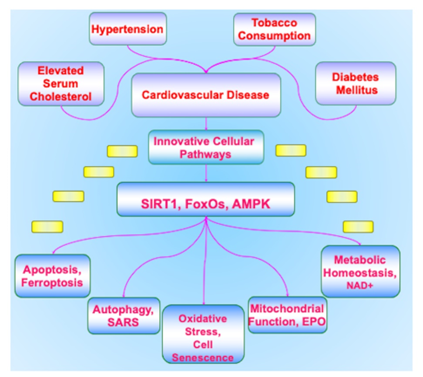Innovative therapeutic strategies for cardiovascular disease
DOI:
https://doi.org/10.17179/excli2023-6306Keywords:
AMPK, apoptosis, autophagy, FoxO, NAD , SIRT1Abstract
As a significant non-communicable disease, cardiovascular disease is the leading cause of death for both men and women, comprises almost twenty percent of deaths in most racial and ethnic groups, can affect greater than twenty-five million individuals worldwide over the age of twenty, and impacts global economies with far-reaching financial challenges. Multiple factors can affect the onset of cardiovascular disease that include high serum cholesterol levels, elevated blood pressure, tobacco consumption and secondhand smoke exposure, poor nutrition, physical inactivity, obesity, and concurrent diabetes mellitus. Yet, addressing any of these factors cannot completely eliminate the onset or progression of cardiovascular disorders. Novel strategies are necessary to target underlying cardiovascular disease mechanisms. The silent mating type information regulation 2 homolog 1 (Saccharomyces cerevisiae) (SIRT1), a histone deacetylase, can limit cardiovascular injury, assist with stem cell development, oversee metabolic homeostasis through nicotinamide adenine dinucleotide (NAD+) pathways, foster trophic factor protection, and control cell senescence through the modulation of telomere function. Intimately tied to SIRT1 pathways are mammalian forkhead transcription factors (FoxOs) which can modulate cardiac disease to reduce oxidative stress, repair microcirculation disturbances, and reduce atherogenesis through pathways of autophagy, apoptosis, and ferroptosis. AMP activated protein kinase (AMPK) also is critical among these pathways for the oversight of cardiac cellular metabolism, insulin sensitivity, mitochondrial function, inflammation, and the susceptibility to viral infections such as severe acute respiratory syndrome coronavirus that can impact cardiovascular disease. Yet, the relationship among these pathways is both intricate and complex and requires detailed insight to successfully translate these pathways into clinical care for cardiovascular disorders.

Downloads
Published
How to Cite
License
Copyright (c) 2023 Kenneth Maiese

This work is licensed under a Creative Commons Attribution 4.0 International License.
Authors who publish in this journal agree to the following terms:
- The authors keep the copyright and grant the journal the right of first publication under the terms of the Creative Commons Attribution license, CC BY 4.0. This licencse permits unrestricted use, distribution and reproduction in any medium, provided that the original work is properly cited.
- The use of general descriptive names, trade names, trademarks, and so forth in this publication, even if not specifically identified, does not imply that these names are not protected by the relevant laws and regulations.
- Because the advice and information in this journal are believed to be true and accurate at the time of publication, neither the authors, the editors, nor the publisher accept any legal responsibility for any errors or omissions presented in the publication. The publisher makes no guarantee, express or implied, with respect to the material contained herein.
- The authors can enter into additional contracts for the non-exclusive distribution of the journal's published version by citing the initial publication in this journal (e.g. publishing in an institutional repository or in a book).





